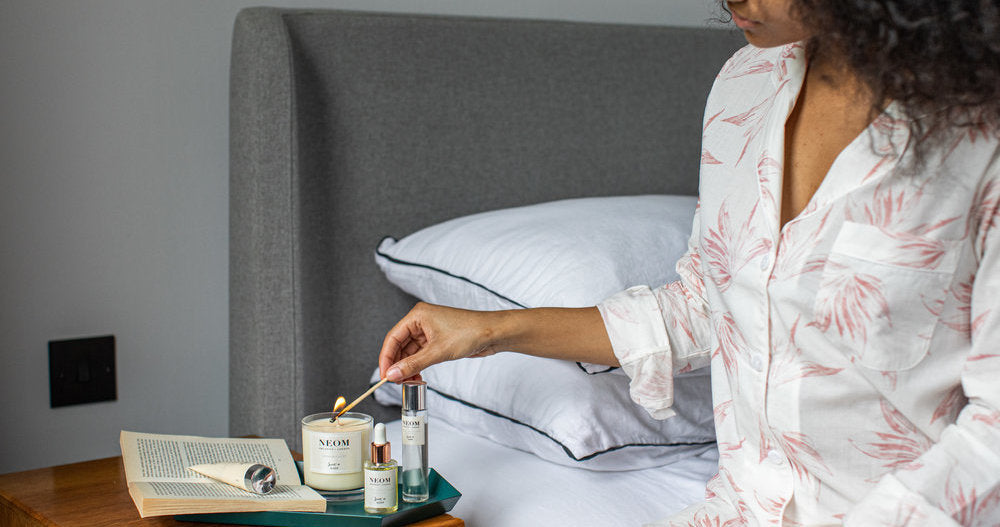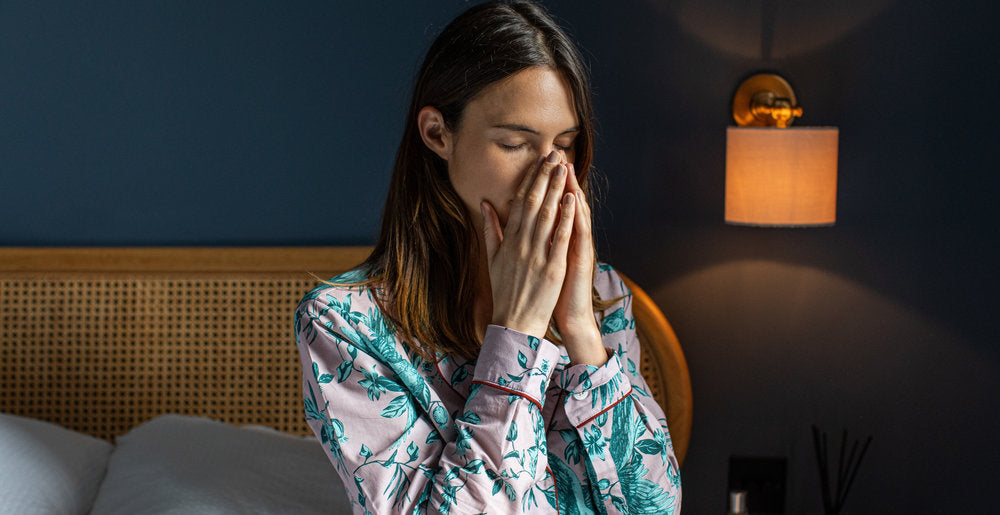How did you sleep? A regular question on our morning team Zoom calls. We asked our community this too and received responses like “awake since 3.20am”, “rubbish! In my third trimester with Covid19 worries” and “4 month sleep regression - what even is sleep?” Safe to say SLEEP is not coming all-that-easy for some of us right now.
When you consider that 30% of people experience a poor quality of sleep most nights of the week and 74% of Brits get less than the recommended 7-9 hours according to research by The Sleep Council, it’s no surprise that we’re all turning to Dr Google for answers and advice. Because as we’ve reported previously, not enough shut eye can impact skin, overall health and mental aptitude. Without it our bodies can’t heal, restore and eliminate toxins so when we do wake up, we’re starting the day far from feeling 100% and raring to go.
But do you want to know what everyone else does or are your questions one of a kind? Last year ‘Why Am I So Tired’ came up as number 9 in a survey of most Googled ‘why’ questions with 74,000 global searches but we wanted to drill down into what’s going on here in the UK. That’s why we went straight to Google and asked them to hand over the top 5 things we’re all desperate to know about sleep. Then we asked Lisa Artis, Head of The Sleep Council to answer them. Interested to know the top five things we’re desperate for help with? Read on…
1. How Much Sleep Do I Need?
While there is no magic number for how much sleep we should get, there is a general consensus that around seven to eight hours is best. Experts believe that most adults require somewhere between six and nine hours in order to feel refreshed and to function well both mentally and physically. However, it’s important not to get too hung up on your sleep quantity but focus on sleep quality instead.
2. How To Fall Asleep?
According to our research published in the Nature of Science and Sleep, the biggest indicator of good sleep health was how long an individual perceives it takes them to fall asleep. Those who think they fall asleep within 10 to 15 minutes of their head touching the pillow are more likely to have good sleep health. Longer than 15 minutes and sleep health may be under pressure.

But how do you ensure you get to sleep within 10-15 minutes? The answer is to follow these tips.
- Try to stick to regular hours by going to bed and waking up at roughly the same time. Your body and mind will feel much better for it.
- Wind down properly! Routines that are associated with sleep signal to the brain that it’s time to wind down – a warm bath, a milky drink, reading or listening to soothing music.
- Keep a notepad and pen in your bedside drawer. If the minute your head hits the pillow you start thinking about your ‘to do’ list or worrying about something, write it down. It clears the mind making it easier to concentrate on getting a good night’s sleep.
- Get out of the habit of surfing the internet, scrolling through social media or falling asleep to the TV. Switch off your phone, tablets and TV at least 30 minutes before bed. Screen time stimulates the brain making it harder to switch off. Also, the blue light that emits from these devices’ messes around with your body’s circadian rhythms by suppressing the sleep inducing hormone melatonin in the brain, which is what we need in order to feel sleepy.
- Don’t be tempted by a glass of your favourite tipple. Too much alcohol, especially late at night, can play havoc with sleep patterns. It might help you fall asleep initially but will interrupt your sleep later on in the night. Plus you might wake dehydrated needing the loo!
- Don’t press the snooze button! If you press the snooze button, your brain knows it'll go off again. You won't get any of the deep, resting slumber in between snoozes. Set your alarm for when you definitely have to get up.
- Invest in a comfortable, supportive bed – it’s central to getting a good night’s sleep. Try to spend as much as you can afford and buy as big as you can.
- Create the perfect sleeping environment – cool, quiet, dark and clutter free. Remember the bedroom is not a dumping ground for the rest of the house but should be a space of calm.
- Don’t eat a big meal too close to bedtime: it’s very bad for digestion. Your stomach will be doing overtime while the rest of you is trying to sleep. Also, your metabolic rate slows down at night so less fat is being burned off. On the other hand, don’t go to bed hungry - if you are feeling a bit peckish, have a warm milky drink and a piece of fruit. Exercise is obviously a good idea – but, again, not too close to bedtime.
- Try not to nap more than two times each week: it lessens the need for nocturnal sleep.
- If you can’t sleep, don’t lie there staring at the ceiling and worrying about it. Get up and do something you find relaxing until you feel sleepy again - then go back to bed.

3. Why Can't I Sleep?
There are many reasons why we struggle to sleep – everything from having the wrong type of bedroom environment, to drinking alcohol, eating too late, sleeping on an uncomfortable bed and not relaxing properly before bedtime. However, stress and worry are the main factors that cause disturbed sleep and when we don’t sleep well it makes us more anxious and worried. Our 2017 survey found that many of us are too anxious to sleep: nearly half of the respondents said that stress or worry keeps them awake at night (45%), rising to 50% of women (compared to 39% of men) and 58% of those in a relationship.
4. What Is Sleep Paralysis?
Sleep paralysis is a parasomnia when the body is unable to move (or speak) for a very short period of time – often a few seconds – but there is a feeling of consciousness. It occurs in REM sleep (when dreams occur) and it’s not harmful but can be very frightening. Many people have sleep paralysis once or twice in their life, others a few times a year but some will experience it more frequently. It affects people of all ages and is most common in teenagers and young adults. It is usually caused by sleep deprivation, irregular sleeping patterns, sleeping on your back, narcolepsy or a family history.
5. How To Sleep Better?
To ensure you experience good sleep it’s essential to follow good lifestyle habits and to eliminate the factors that are causing you disturbed sleep. For example, making sure your bedroom is the right environment, that your bed is comfortable and supportive, looking at the lighting in your home, and avoiding foods and drinks that can hinder sleep.
As mentioned previously, avoid screen time at least an hour before bed and find alternative ways of relaxing like warm baths with calming scents, quiet soothing music, reading, gentle stretching and yoga. It’s also important to establish a regular sleep pattern – going to bed and waking up at roughly the same time – both your body and mind will feel better for it.
Discover NEOM's Sleep Hero's...







